

Coronaviruses are a large family of viruses ranging from common colds to more severe diseases. COVID-19 is a new strain of Coronavirus, not previously seen in
humans. It is airborne, highly infectious, can result in fatalities and there is no vaccine.
Current analysis shows that out of those who have tested positive for the virus, 8 out of 10 may only experience flu-like symptoms and will make a full recovery,
but 2 out of 10 will experience a more severe disease or develop into a more critical condition. The more critical and severe cases predominantly occur among
the elderly or people with pre-existing medical conditions, but even if you are fit and strong it is likely that you work and live alongside people who are vulnerable, so we all must step up the levels of precautions to help reduce infection rates.
Those most at risk – Please share with us if you have an underlying condition
The company wants to protect all our people, especially those who may be at higher risk of a serious complication or even death should they be in the more at
risk category i.e. the 2 out of every 10.
We wish to respect privacy but in order to best safeguard we need you to tell us if yourself or someone who works for us is at higher risk due to having a preexisting health condition e.g. a history of respiratory issues, organ damage etc. That will allow us to make special arrangements to better ensure their protection.
We understand that some may not feel comfortable divulging personal information to a Line Manager and so you are invited to speak to the managing Director
who will treat the matter with confidentiality.
COVID-19 – Be alert to the following symptoms, either in yourself, your family members or co-workers
· Dry Cough
· Fever – (A fever is usually when your body temperature is 38C (100.4F) or more. You may feel particularly warm, cold or shivery.)
· Shortness of breath
Should you have the above symptoms then it is essential that you do not come into work. Instead you should contact your Line Manager at the earliest opportunity who will in turn notify HQ. Furthermore, even if you appear to be unaffected, if someone very close to you (e.g. a family member or person in your household) has the above symptoms, then it is likely you will have acquired it too and so we ask that you remain at home, avoid close contact with others in the household and contact NHS 111, particularly if you have an pre-existing health condition. We acknowledge that this may be difficult for busy, productive people to
voluntarily do, however we all must do what we can to reduce the spread of the virus.
Typically the illness lasts for 14 days and once a person is confident they are recovered you must again contact your Line Manager who will be happy to discuss
the process of your return to work.
What can be done to minimise transition
· When you arrive at work you must wash your hands thoroughly for 20 seconds with soap and hot water. If that is not available to you then advice is to
clean your hands with an alcohol-based hand gel.
· Where practical maintain social distancing – advice is to maintain at least 1 meter (3 feet) between yourself and anyone else, or further if someone is
coughing or sneezing. We know that is not practical in all situations, however reducing this as much as possible will greatly help reduce transmission.
· Avoid touching eyes, nose and mouth – hands touch many surfaces and can pick up viruses. Once contaminated, hands can transfer the virus to your
eyes, nose or mouth. From there, the virus can enter your body and can make you sick.
· Cover your nose and mouth with a disposable tissue when sneezing or coughing.
· All used tissues should be immediately disposed of and clean hands with soap and water or hand sanitising gel afterwards.
· If you are taking paracetamol, ibuprofen or similar mild painkillers for mild symptoms, these can mask further symptoms of a viral infection.
· If you have a fever, cough and difficulty breathing, seek medical attention by calling 111 or using the NHS online 111 Coronavirus Service.
· Consider replacing necessary meetings with video or telephone conferences instead or meeting face-to-face.
· Avoid unnecessary travel abroad.
Overseas Travel
If you have been to one of the below higher risk countries in the last 14 days:
• stay at home and avoid close contact with other people
• do not go to a GP surgery, pharmacy or hospital
• use the NHS 111 online coronavirus service to find out what to do next
If you have not been overseas but think you may have been in close contact with someone who has been to one of the below locations or has contracted COVID19, please do not attend work but telephone your line manager.
Countries and areas with a higher risk of coronavirus are: Cambodia, China, Hong Kong, Iran, Italy, Japan, Laos, Macau, Malaysia, Myanmar (Burma), Singapore,
South Korea, Taiwan.